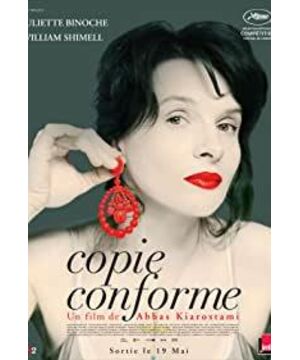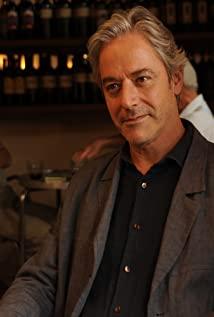James Wood mentioned Abbas Kiarostami's film Through the Olive Trees in "How Fiction Works" and explored the relationship between fiction and reality, commenting that "Kiarostami's fascination with fictionality—his films often collapse the theatrical fourth wall— emerges naturally from his great interest in the real ". In Legal Copy, the relationship between fiction and reality is also explored through counterfeit and genuine. Juliet took William to an art gallery where there was a painting that was mistaken for the real thing but was actually a fake, and the fake was actually a fake, but that didn't stop the museum from showing it. Juliet said that this painting is an example of William's book point of view, William said that such examples are everywhere in life, the real original is actually a girl, just like the real original in the Mona Lisa was not painted by Leonardo da Vinci himself That painting, but Gioconda, the prototype of the Mona Lisa. William feels that we don't have to pay attention to the real and the fake, as long as it is "good", so fakes also have value in appreciation. Juliet's antique store is actually full of imitations. She also said that "imitation is better than real". It is also very similar to James Wood's "How Fiction Works" in "How Fiction Works" proposed a convincing impossibility in mimesis is always preferable to an unconvincing possibility. All in all, the copy is legal, as the title suggests.
But I am more interested in the relationship between the two. I think these two might be a couple, and the overall feel of this film is very much like Kazuo Ishiguro's The Unconsoled. If you have read Ishiguro's book, it is not difficult to accept that the two are husband and wife. "The Unconsoled" was published around 2000, "Legal Copy" was filmed in 2010, maybe Abbas saw it? Anyway, just my guess. Again, why do I think so. Juliet told the cafe owner that we have been married for 15 years, but did not mention it to William, including the conversation between the two in the restaurant afterwards. Juliet said "last night was the wedding anniversary" and did not mention the specific time, while William Exactly 15 years, how did he know? Maybe just a coincidence? The second is that Juliet described William's shaving habit to the cafe owner, "It's a habit, I shave once every two days." But later in front of the hotel, William said the exact same thing, how did he know? I think these two places reveal a kind of tacit understanding between ordinary couples. Even if the relationship is indifferent after long-term separation, there can still be some flashes of memory when they meet again. In "The Unconsoled", Sophia and Rhett are actually a couple, and they also have a son. Reed is a pianist, so busy saving the world with his art (William is a writer) that he has been away for so long that he forgot he had a family. In his conversation with Sophie, he too, like William, occasionally reveals some memories of the past, and of course at times shows alienation that makes us suspicious (William does too, saying to Juliet "You remind me of your son" , the conversion of the person here shattered the close relationship that the two had established. Hills" began to show the talent of being called a master of transformation. ) The locations of Sophie and Reid in the book have been changing, and in the movie Juliet and William also pass through antique shops, art galleries, cafes, squares, restaurants, churches, hotels and other locations. They are all chaotic, creating a dream-like feeling, and Juliet also sighed in the movie, "It's like a dream here." Reid in the book is very tired and very cold towards his family. William in the movie is also tired and impatient. Many times he just maintains superficial courtesy, and even says "My family takes care of them, I take care of mine" In this case, can this be a piece of evidence that they are actually husband and wife? At the end of the novel, Rhett rushes to another city to continue the show, and William has to catch the 9 o'clock train to leave the hotel where the two got married, and finally both men abandon their two heartbroken women and sons.
Maybe the two are not husband and wife, but a copy of the husband and wife, and as Juliet said, "the imitation is better than the real one", whether the two of them have achieved the director's purpose as a husband and wife, because the audience really can't tell. . As for the above-mentioned details to prove that they are husband and wife, maybe there is no need to struggle, after all, it is enough to make a copy, right?
I also think this one is more Ozu Yasujiro's style than the "Like a River" filmed in Japan. A lot of shots are aimed at the characters who are talking in the center of the screen. For example, when the two were in a cafe, they were never shot from the side. Conversation between the two. Shooting this way, Juliet's expression in cafes, dressing rooms, and restaurants can be seen at a glance, which is really pleasing to the eye.
What fascinates me more about this movie is the language switching, especially when the two face off in a restaurant. After William tasted something wrong with the wine, they switched from their English conversation to men speaking English and women speaking French. When looking at the statue in the square, the two spoke French. The rest of the time seems to have been in English, which means that Juliet has been obeying William and speaking the language that William knows. The confrontation between English and French symbolizes the lack of communication between the two, and the contrast between the strength of the two represented only in English or only in French. Juliet in the square believes that a woman puts her head on a man's shoulder. The feeling of happiness and contentment It was great, and two French-speaking tourists were asked to support their point of view, so three against one, William had to obey. However, Juliet's English is not very good, and I think it is difficult to tell whether it is English or French. I can only understand simple Italian. This conversion may need to be read several times. However, Abbas's films like language conversion and translation. In "Like a River in Love", the old professor also does translation at home after retirement. And the relationship between him and the person who asked him to be a translator seems to be relatively tense, such as being at home and not answering the phone or dawdling.
In short, this is a work that makes me very excited, and I have to rewrite it a few times.
View more about Certified Copy reviews











